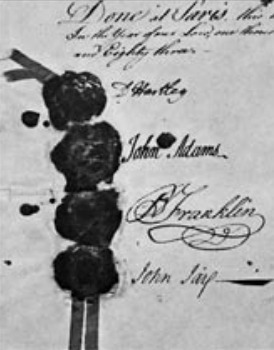The pledge of Allegiance by David Barton
As previously noted, the Court's standard for what
constitutes an unconstitutional religious activity had grown increasingly more
narrow and restrictive from case to case; the Weisman case proved no exception.
In it, the Court introduced a new test for constitutionality: the
"psychological coercion test." Under this test, if a single individual finds
him uncomfortable in the presence of a religious practice in public, then that
activity is unconstitutional. The Court alleged that the unconstitutional
"psychological coercion" had occurred when the crowd stood for Rabbi
Gutterman's prayer:
What to most believers may seem nothing more than a
reasonable request that the nonbeliever respect their religious practices, in a
school context may appear to the nonbeliever or dissenter to be an attempt to
employ the machinery of the State to enforce a religious orthodoxy? The
undeniable fact is that the school district's supervision and control of a high
school graduation ceremony place public pressure, as well as peer pressure, on
attending students to stand as a group or, at least, maintain respectful
silence during the Invocation and Benediction. The dissent vehemently objected
to this new test:
As its instrument of destruction, the bulldozer of its
social engineering, the Court invents a boundless, and boundlessly manipulable,
test of psychological coercion. The opinion manifests that the Court itself has
not given careful consideration to its test of psychological coercion. For if
it had, how could it observe, with no hint of concern of disapproval, that
students stood for the pledge of Allegiance, which immediately preceded Rabbi
Gutterman's invocation? .
Since the Pledge of Allegiance included the phrase "under
God," recital of the Pledge would appear to raise the same Establishment Clause
issue as the invocation and benediction. If students were psychologically
coerced to remain standing during the invocation, they must also have been
psychologically coerced, moments before, to stand for and thereby, in the Court's
view, take part in or appear to take part in the Pledge.
David Barton's Blog
- David Barton's profile
- 256 followers




